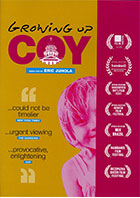
Growing Up Coy 2016
Distributed by Outcast Films, 511 6th Avenue Suite 398, New York, NY 10011; 646-512-2596
Produced by Eric Juhola and Jeremy Stulberg; Co-produced by Randy Stulberg
Directed by Eric Juhola
DVD, color, 82 min.
General Adult
Children, Civil Rights, Transgenderism
Date Entered: 08/17/2017
Reviewed by Sophie M. Forrester, Reed Library, State University of New York at FredoniaIn 2013, the Mathis family made the national news when parents Kathryn and Jeremy sued their transgender daughter, Coy’s school district over her right to use the girls’ restroom. A family that’s spoken repeatedly to outlets ranging from local news to Katie Couric’s talk show may seem to have little more to offer. Indeed, Kathryn notes at one point that Coy has grown tired of answering the same questions.
But Growing Up Coy does a remarkable job of drawing out the story beyond what the Mathises had already revealed. Specifically, it shows the darker side of civil rights battles, as Coy’s parents are forced to consider moving to another town in order to send their children to a more accepting school, then find their marriage strained by the weight of constant media scrutiny.
The film is uninterested in flash and dazzle, with no navel-gazing or interest in celebrity. (In fact, Laverne Cox, arguably America’s foremost trans celebrity at the time, isn’t even named on screen when she briefly appears introducing the family at an unspecified ceremony.) Instead, it’s about the harsh realities facing individual trans people and the loved ones willing to fight for their rights. In that way, one of its particular strengths is its ability to connect Coy’s story with larger struggles affecting trans children and adults alike, as when an expert discusses the psychological domino effect of denying trans people access to restrooms aligned with their gender identity.
Growing Up Coy contains material that may be upsetting to transgender and otherwise sensitive viewers, often showing transphobic responses to the news story with little or no warning. Nonetheless, it is a strong film not only about parents of transgender children, but about the lives of transgender people as a whole. Recommended for academic or public libraries.
Awards:
- Best Documentary, Raindance Film Festival, 2016
- Best Documentary, BendFilm Festival, 2016
- Festival Theme Award, Ojai Film Festival, 2016